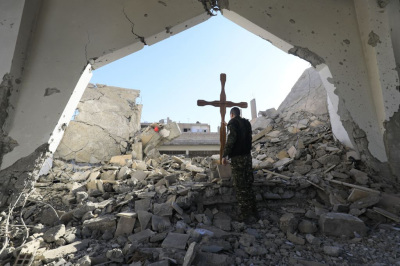Sanctions are harming Christian charity organizations in Syria

Imagine that a Christian or a church in the U.S. or in Europe is eager to partner with Syrians in Syria for church ministry and to serve the poor. They get in touch with a small group of faithful believers who are actively ministering in their communities and sharing their hope in Christ.
After building the personal relationship and a shared vision, the western church expresses a desire to support the local church financially. But how can the ministry send the funds to Syria, a country under U.S. and European Union sanctions? Could “to the ends of the earth” (Acts 1:8) end where U.S. and European Union sanctions begin? Is the U.S. and European Union response to the evil, the crimes, of Syrian authorities denying churches the ability to act?
Sanctions are causing daily struggles for those trying to help Syrians. Last September I met in Geneva with Nabil Antaki, a Christian medical doctor from Aleppo. Dr. Antaki shared with me that he and his colleagues sought to send to a Syrian hospital a much-needed ultrasound machine to diagnose cardiac problems. They launched a fundraising campaign to buy this machine. When his bank realized that he was collecting funds to buy medical equipment for Aleppo, it closed his account for fear of running afoul of the sanctions regime.
In a recent wave of heavy sanctions enforcement actions by the U.S. Treasury, global banks paid fines in the billions of dollars for dealing with Syrian entities in violation of U.S. sanctions. Simply put, banks are not willing to deal with Syrians or Syria.
To remedy the detrimental impact of sanctions, U.S. and European Union legislation have included exclusions and the possibility to apply for exemptions or licenses. In theory, this can allow humanitarian work and other types of charitable efforts to continue apace. In September 2021, for example, while U.S. Department of Treasury imposed sanctions on persons and entities responsible for the current wave of violence in Ethiopia, it simultaneously issued a General License designed to protect a broad array of civil society activities.
However, applying for such exemptions is a complicated process. The scope of exemptions varies significantly from one country to the other. Applying for exemptions requires staff, expertise and financial resources that many, if not most, churches and ministries do not have.
One Christian organization working in Syria did receive an exemption from sanctions by U.S. authorities to send money for their workers. However, they did not receive an exemption for the relief and aid, and they were not able to provide money for any expenses other than salaries. This ministry in Syria now has workers who get paid but cannot acquire anything to help those around them. Another organization shared that funding for the repair of a window in Syria is allowed, but fixing a wall is not because the latter falls in the category of reconstruction, which is explicitly prevented by U.S. policy towards Syria.
A vicious cycle is preventing a durable solution to this problem. Western countries say they will not approve reconstruction funding for Syria, or drop sanctions, without a political settlement. On the other hand, the Syrian regime is not interested in Western reconstruction money and does not intend to allow the West to use reconstruction as a way to weaken its political grip.
Many large humanitarian organizations, including Christian organizations, do succeed in receiving the necessary authorizations to operate in Syria. However, banks fail to recognize these authorizations. In 2020, according to one unpublished survey of over 20 international organizations, 12% of their requested transfers to Syria were rejected by international banking institutions. Of those processed, 12% were unsuccessful and 32% faced severe delays ranging between a minimum of three months to almost 10 months.
What is happening with Syria is not unique. Since August 2021, churches and ministries supporting their local counterparts in Afghanistan have suddenly awoken to a new reality; in the hour of greatest need for Afghans, international banks will not transfer their funds to Afghanistan.
How can churches and ministries respond?
We are in this world, so we obey the rules and regulations of our respective authorities. We understand that sin causes great harm and that sanctions could persuade leaders not to pursue their sinful desires and their harm for those bearing the Image of God. But our theology of sin also informs us that those who impose sanctions are also sinful, and their actions can cause harm.
We are not of this world (John 17:14 and 16). We answer to a greater calling. Our hope is not in earthly structures and systems. Therefore, our relationships on earth and our dialogue with those who impose sanctions must be shaped not by our respective authorities, but by the will and calling of our Maker and Savior. It is part of our calling to challenge all those in power to stop actions that harm people.
So let’s endeavor to talk more about the impact of sanctions in the hope that shedding a light on this serious cause of suffering will bring about necessary change. I invite ministries to reach out to the WEA office in Geneva ([email protected]) and share about their experiences, to better understand how to advocate in support of the churches and ministries in Syria, Afghanistan, and elsewhere.
To learn more, and to see what the World Evangelical Alliance is advocating for, read the WEA statement that I read at the September event.
Wissam al-Saliby is an Advocacy Officer of the World Evangelical Alliance in Geneva, Switzerland where he advocates with the United Nations on behalf of national evangelical alliances in over 130 countries for freedom of religion, rule of law, and human rights. You can follow him on Twitter at @walsaliby.




















